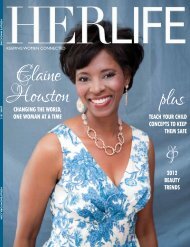You also want an ePaper? Increase the reach of your titles
YUMPU automatically turns print PDFs into web optimized ePapers that Google loves.
herlife | mother’s perspectiveHelpingYour Child DealWith TheirChanging Bodiesby laura wynnAs parents, we watch our children grow with joy and excitement.That glee can turn quickly to sorrow, however, whenwe discover that our kids may be struggling with thesemilestones; feeling discomfort or even anxiety about what is happeningwithin their bodies. Body image is a very important part of howthey define who they are. As embarrassing or difficult as it may be foryou to talk about sensitive topics, expect your changeling to feel evenmore uncomfortable. Don’t wait for your child to come to you withquestions about his or her changing body. Body image is important, especiallyduring developmental years, so let your child know that you’reavailable to talk any time. Assure your child that these conversationsmight be uncomfortable, but that they are important and that you areunconditionally available to answer any and all questions.Before approaching a child who is developing, consider the personalityof your changing child and address the topic of developmentin a way that is comfortable for that particular personality. Parentalreaction can contribute to any fears they may be experiencing. In thecase of our oldest son, I unknowingly created feelings of anxiety overthe discovery of his first loose tooth. A cautious and analytical child, hebecame alarmed when I wiggled his tooth and screeched in glee. As aresult, I was banned from his mouth. Several weeks later I found a tinytooth in his dresser drawer. I learned he had lost it the day before atschool. I was devastated to know that my son’s first tooth loss experiencewas assisted by a school nurse because he knew she wouldn’t“talk about it all the time and scream at him.” For this child, less conversationand withheld excitement from Mom and Dad has continuedto be the key to open communication as he matures and has concernsregarding his body.A common concern, and perhaps the most often addressedregarding juvenile development is weight. Opinions about the bestway to teach our children about weight and acceptable levels of gainor loss vary immensely. Regardless of your personal values, the key tosuccess with this issue is to confront potential weight problems withsensitivity, compassion and the ability to listen to your child. Be preparedto acknowledge concerns that may be contributing to displeasurein your child’s self-image. It’s imperative that a parental figure remainsupportive throughout this and all changes. “Preaching” or insultinga child will likely result in the topic becoming closed for discussion.Consult a physician for assistance in determining appropriate weightand exercise routines for your child’s body type.As adults we understand that each of us is different from oneanother. Children, however, need constant assurance that they are“normal” as they develop. Even small differences may make them“Don’t wait for your childto come to you with questionsabout his or her changing body.”feel like they stand out. My youngest child was born with a large, redbirthmark that covered her entire arm, hand and shoulder. I was consistentlysurprised when first-time visitors would ask what was “wrong”with her. Our pediatrician voluntarily informed us that we could seeklaser removal treatments as early as six months to avoid stigma. I wassurprised that cosmetic surgery was offered as a solution to a problem42 <strong>HER</strong><strong>LIFE</strong>MAGAZINE.COM
















